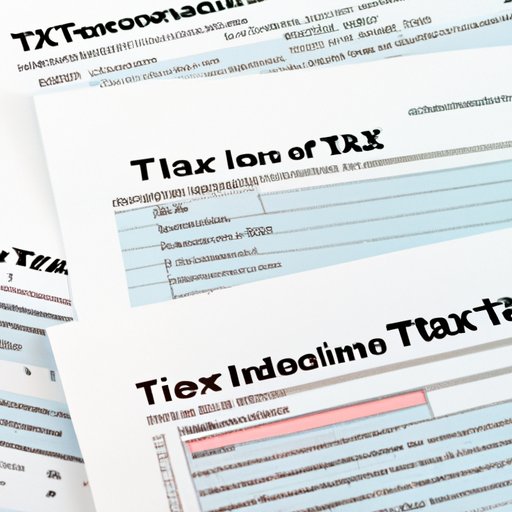
Introduction
As the saying goes, there are only two things certain in life: death and taxes. While the former cannot be avoided, the latter can be prepared for in advance. Filing taxes on time is not just a legal obligation, but it can also benefit taxpayers in the long run by avoiding penalties and reducing stress. In this article, we will provide a comprehensive guide to tax filing deadlines, basic steps involved in filing taxes, early tax filing, tax extensions, and what to do if you miss the tax filing deadline.
The Ultimate Guide to Tax Filing Deadlines: Stay Ahead of the Game!
There are several tax filing deadlines throughout the year that taxpayers need to be aware of, including federal, state, and local deadlines. The federal tax filing deadline is April 15th, while state and local deadlines may vary depending on the state or municipality. Taxpayers need to complete different types of tax forms for each deadline, including the individual income tax return form, W-2 form, and 1099 form. To prepare for tax season, taxpayers should keep track of their documents and receipts throughout the year, and organize them in a secure place. This will help ensure that they have all the necessary information to file their taxes accurately and on time.
Are You Ready to File Your Taxes? Here’s What You Need to Know!
The basic steps involved in filing taxes include gathering all necessary documents, filling out tax forms accurately, and submitting them to the appropriate tax agencies. Taxpayers can take advantage of common tax credits and deductions to reduce their taxable income, such as the earned income tax credit, child tax credit, and mortgage interest deduction. It’s also important to avoid common mistakes when filing taxes, such as entering incorrect information, missing deadlines, and not claiming all eligible deductions and credits.
A Quick Guide to Early Tax Filing: Pros and Cons to Consider
There are potential benefits to filing taxes early, such as getting a refund sooner and avoiding last-minute stress. However, there may also be some drawbacks, such as potential changes to tax laws later in the year that could affect the amount of your refund or taxes owed. Taxpayers should consider their individual circumstances before deciding whether to file early or wait until closer to the deadline. To file early, taxpayers can use tax preparation software or hire a tax professional to help them.
How to File for a Tax Extension: A Comprehensive Guide
If taxpayers are unable to file their taxes by the deadline, they can request a tax extension by filling out Form 4868 and submitting it online or by mail. While filing for an extension may provide some relief, it’s important to note that it generally only extends the deadline for filing the tax return, not for paying any taxes owed. Taxpayers should also be aware of potential penalties or fees that may result from filing for an extension or not paying taxes owed on time. To ensure they still file their taxes on time, even if they receive an extension, taxpayers should estimate their taxes owed and make a payment accordingly.
What Happens if You Miss the Tax Filing Deadline? Here’s What to Do
Missing the tax filing deadline can result in penalties and fees, as well as potential legal consequences. However, there are still options available to rectify the situation. Taxpayers can file a late return as soon as possible to minimize the amount of penalties and fees assessed, and set up a payment plan to pay any taxes owed over time. It’s also important to address any misconceptions about missing the tax filing deadline, such as assuming that not owing taxes means not needing to file a return.
Conclusion
Filing taxes on time is a legal obligation that can benefit taxpayers in the long run. By following the guidelines and tips provided in this article, taxpayers can stay ahead of the game and avoid penalties and stress associated with late or incorrect tax filings.





